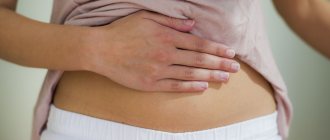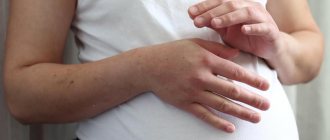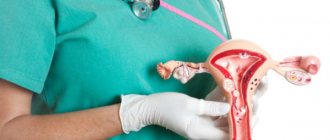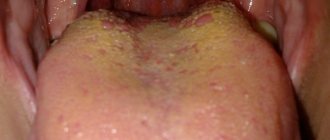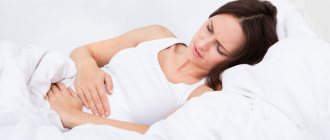The body of a pregnant woman, along with the growth of the fetus, is constantly rebuilt and changing: taste preferences may change or unusual reactions to familiar foods may appear, which is often accompanied by diarrhea.
In this article, we will look at what causes diarrhea in pregnant women in the second trimester, as well as possible preventative measures and treatment options.
- Causes of the disease
- What are the dangers for a woman and fetus? Proper nutrition
- Medications
- Traditional methods
Safe treatments for diarrhea during pregnancy
Loose stools in an expectant mother in the early stages of expecting a baby can appear for many reasons:
- change in diet;
- poisoning;
- infectious infection;
- chronic gastrointestinal diseases;
- eating large amounts of fiber;
- increased nervousness of the expectant mother;
- blood pressure surges;
- hormonal changes in the body;
- helminthic infestations;
- Previous use of laxatives.
Diarrhea can also be short-term in nature, associated with a restructuring of the body or a change in diet, but it can also be an echo of more serious problems.
https://www.youtube.com/watch?v=9wprcyG66Ww
It is necessary to observe not only the consistency, but also the smell and color of the stool.
- Often, loose stools in the first months are associated with toxicosis. This is how the body reacts to hormonal imbalance, accompanied by nausea, heartburn, and sometimes vomiting. These unpleasant phenomena are especially observed in the mornings. The stomach does not want to accept the usual food and the woman eats mainly light food - fruits or vegetables. This provokes gastrointestinal upset, which causes stool liquefaction.
- It happens that when planning a pregnancy, the expectant mother takes vitamins or dietary supplements. In this case, the stool may be dark in color, especially if iron was present in the vitamins.
- Changing taste preferences. Pregnant women are famous for their strange desires to eat incompatible foods. They want to wash down salted fish with milk and snack on a piece of pineapple, or eat a pickled cucumber after a sandwich with jam. Such combinations provoke intestinal upset, which is consequently accompanied by changes in stool.
Loose stools caused solely by pregnancy do not require medication. At the same time, the woman does not experience fever, muscle weakness, fever, or loss of strength. The stool may change color due to the foods consumed, but must be clean and free of blood. The urge to go to the toilet does not exceed 3 times a day.
In this case, the body only needs adjustments to its diet and lifestyle.
In case of poisoning
Poor quality food or improperly stored products cause diarrhea, nausea, and provoke vomiting. Toxins entering the intestines with spoiled food are reflected in it by twisting pains.
First of all, in case of poisoning, you need to rinse the stomach and start taking adsorbent drugs.
Parasites, various viruses, and bacteria upset the functioning of digestion, which leads to secretory diarrhea. The color of stool usually takes on a green tint and has a thick, watery consistency. There is an increased temperature, abdominal pain and vomiting.
Such symptoms are dangerous due to dehydration and require medical intervention.
In this condition, the pregnant woman suffers not only from painful diarrhea, but also from weakness, bloating, and nausea. There is an unpleasant taste in the mouth.
When there are problems with the gastrointestinal tract, hyperexudative, hypokinetic and osmolar diarrhea is observed. It differs from other types of diarrhea in that pregnant women’s stool contains blood, pus, a lot of mucus or undigested pieces of food. Intestinal motility is impaired, nutrients are not absorbed, which leads to disorder.
Intestinal bleeding is diagnosed:
- cold sweat;
- pale skin;
- low blood pressure;
- bloody vomiting.
In most cases, diarrhea is not a disease; it only indicates a malfunction of individual systems. This condition indicates that toxins, viruses or allergens have entered the body. Sometimes such symptoms occur due to hormonal changes in the body. The disease is accompanied by pain in the lower abdomen, frequent and liquid discharge from the intestines.
Diarrhea during early pregnancy can be caused by various reasons.
The reaction can be caused by the following factors:
- Viral infection. The virus poses a danger to any person. Its symptoms are nausea, high fever, and nasal congestion. Usually this condition lasts for several days.
- Bacterial damage. This is a more serious disease, which, in addition to high temperature, has the effect of intoxicating the body. It does not go away on its own; specialized treatment is required to relieve symptoms.
- The first weeks of pregnancy. The intestinal reaction in this case may overlap with other symptoms of toxicosis. In this case, diarrhea can be both a manifestation of infection and a sign of pregnancy. In the early stages, this indicates individual gaps in health; in the last month of pregnancy, this condition signals an approaching birth.
In addition to frequent urge and loose stools, the condition is characterized by the following symptoms:
- general weakness of the body;
- unpleasant headaches;
- high temperature;
- spasms and pain in the stomach and intestines;
- the appearance of chills, nausea and vomiting.
Together, these signs indicate diarrhea. The severity of the disease and the choice of treatment method depend on the number of symptoms.
Diarrhea during early pregnancy can be a symptom of the following diseases:
- ectopic pregnancy;
- inflammation of the appendix;
- urinary system infections;
- pyelonephritis and pancreatitis;
- intestinal problems.
These are dangerous illnesses that need to be treated immediately after detection. Treatment of diseases with diarrhea is accompanied by constant monitoring of the condition of the fetus.
At the end of pregnancy, this condition indicates readiness for labor. In this case, you need to describe your condition in detail to the observing doctor and begin to prepare for the birth of your baby. The occurrence of diarrhea in midterm is often associated with inflammatory processes in the stomach and intestines, problems with the pancreas and the functioning of the nervous system.
Sometimes the cause of the condition can be poisoning from low-quality products, taking medications or vitamins, and the penetration of parasites. To solve the problem, you should undergo an examination and begin treatment according to the doctor’s recommendations.
When diagnosing diseases, one of the symptoms of which is diarrhea, an external and hardware examination is carried out. This is necessary to exclude pathologies of internal organs in a pregnant woman. In addition, additional examinations are prescribed.
Acute diarrhea is characterized by large losses of fluid and electrolytes. During the initial examination and a more detailed examination, the patient reveals dehydration, increased heart rate and a sharp decrease in blood pressure. When calcium balance decreases, muscle cramps may appear.
In addition to studying the discharge, a visual examination of the proctological area is carried out. If there is a fissure, fistula, or other lesion in the anus, it may be Crohn's disease.
To more fully identify the picture of the disease, instrumental endoscopic techniques are used, such as:
- gastroscopy;
- colonoscopy;
- irrigoscopy;
- sigmoidoscopy.
Such studies allow you to view the walls of the upper intestines and identify existing damage, inflammation and neoplasms.
In acute diarrhea, the diagnosis can be made by visual examination of the affected area and secretions (coprogram), and by studying the patient's complaints. To clarify the symptoms, stool is examined for the presence of worms and bacteria.
When diagnosing chronic diarrhea, it is determined whether the intestines are damaged by harmful bacteria and other parasites. Ultrasound is performed to detect intestinal diseases. In addition, the correct functioning of the liver, pancreas, stomach and intestines is studied.
To diagnose the causes of diarrhea, various methods are used, in particular, ultrasound of the digestive organs and laboratory tests
Microscopy of secretions reveals the content of leukocytes and epithelial cells. Deviation from the norm indicates inflammation of the esophageal mucosa. Excess fatty acids can occur due to malabsorption of fats.
A change in the pH of the intestinal composition, excessive secretion of secretions in the stomach and the presence of tumor formations are detected. Laboratory blood tests are designed to identify whether there are inflammatory processes in the body that are the cause of chronic diarrhea.
During early pregnancy, treatment of diarrhea is associated with certain difficulties, because during this period, expectant mothers should not take medications that can harm the baby. The doctor can examine the patient and, if possible, prescribe safe methods of therapy. Perhaps the situation will be corrected by a simple adjustment of the diet and composition of the diet.
In this case, you should first make sure that the chosen remedies and herbal remedies during pregnancy cannot adversely affect the development of the fetus. Any treatment method should be discussed with your doctor.
If a woman's condition is alarming and there is a possibility of termination of pregnancy, the doctor may prescribe drug treatment using antibiotics. This must be done despite the risk of losing the child. In this case, even when the symptoms are uncomplicated, treatment is carried out exclusively under the supervision of a doctor.
Exceptions to the rules may be adsorbents and the following drugs:
- Smecta. The product is available in powder form, quickly dissolves in water and is absorbed into the blood after administration. When taken, there are no side symptoms or allergic reactions. The drug is completely eliminated from the body. Sold in bags of 10-20 pcs. packaged.
- Enterosgel and activated carbon. These substances quickly remove harmful substances from the body, preventing them from being absorbed into the blood. After taking them, the functioning of many body systems improves, erosions and other lesions of the mucous membrane are scarred.
- Polyphepan. Sold in pharmacies without a prescription in sachets of 200 g. It is not recommended to take it for stomach ulcers.
- Nifuroxazide. This is an antibiotic that is approved for use during pregnancy in the second and third trimester under the supervision of a physician. It is prescribed for diarrhea caused by salmonella, E. coli and other pathogens. The drug is not absorbed into the stomach; it only affects pathogens. The course of treatment is a week.
Useful video
As you know, diarrhea is a very unpleasant phenomenon for every person, but loose stools during pregnancy can also be dangerous, because it causes the removal of useful substances necessary for the baby.
The pregnancy period greatly affects a woman's body. Systems that previously worked flawlessly may fail. In addition to the fact that many chronic ailments will be activated in the body against the background of a decrease in the functions of the immune system, problems with internal organs and systems may occur.
The digestive tract is especially affected. The reason for this is the growth of the uterus, which leads to a malfunction of the gastrointestinal tract and genitourinary system. As a rule, the growth of the fetus leads to the fact that the ureters are compressed in the woman’s body, which causes difficulties with the outflow of fluid. In addition, an enlarged uterus puts pressure on the lower intestine. As a result, the expectant mother often feels severe discomfort in the abdominal area.
To reduce such sensations, you need to consider eating right and staying hydrated. However, all representatives of the fair sex know how difficult it can be to restrain food during pregnancy.
Eating inappropriate foods, coupled with pressure from the uterus on the intestines, can lead to indigestion. Most often, it is for this reason that loose stools appear during pregnancy. Although, there may be other reasons for the problem.
https://youtu.be/A9_GJPkaJXk
How to recognize diarrhea
Diarrhea is a digestive disorder that is very easy to recognize. It is accompanied by painful sensations in the abdomen, a frequent urge to have bowel movements, as well as a change in the nature of the stool (can be mushy, watery or foamy).
Basically, with the help of diarrhea, the body “expresses its attitude” regarding hormonal changes, various viruses, allergens and toxins. Diarrhea usually comes with the following symptoms:
- elevated temperature;
- nausea, vomiting;
- flatulence and intestinal cramps;
- headache;
- general weakness, chills.
There is no need to fear for your own health and the well-being of the fetus if the diarrhea is not severe. As a rule, such a disorder does not last longer than ten days and does not in any way affect the normal course of pregnancy. But is diarrhea always a simple reaction of the body to the “special” physiology of a pregnant woman? There are several “alarm bells” that make it clear that it would be useful to see a doctor. Among them:
- the presence of mucus or traces of blood in the stool;
- diarrhea does not go away for a long time, vomiting and fever are observed at the same time;
- black diarrhea, accompanied by dizziness and weakness.
Such symptoms require an immediate response to their appearance. Perhaps the woman’s ulcer has worsened or internal bleeding has occurred. A visit to the hospital cannot be postponed.
Why does the disorder occur in early pregnancy?
There is still debate about loose stools in the early stages after conception. Some doctors argue that diarrhea does not just come and is a serious “red flag” for concern; the second theory is based on the fact that loose stools are just a reaction to new life in the womb.
Indeed, in the early stages, constipation due to progesterone is considered more normal. But it also happens the other way around. What really happens to the expectant mother?
The appearance of loose stools in a woman during early pregnancy is a common occurrence if it is not accompanied by pain in the intestines, vomiting or fever. This is due to changes in hormonal levels and a decrease in local immunity. It is immunity that plays a significant role in the digestive system. If previously a girl could eat an unwashed tomato, and the body reacted to this calmly, then, being in a position, the intestines cannot fully resist microbes, which leads to loose stools.
In addition, in the early stages, a pregnant woman experiences a malnutrition - refusal to eat can be replaced by excessive overeating, which ultimately leads to similar disorders.
The disorder associated with hormonal imbalance is harmless and goes away on its own. It is not even called diarrhea - it is the usual liquefaction of stool, which does not create severe discomfort in pregnant women.
Types of diarrhea
Experts divide diarrhea into acute and chronic. The acute type of diarrhea lasts 2-3 weeks.
Its reason is:
- infection;
- inflammation of the intestinal tract;
- long-term use of medications.
The stool at this time is liquid with mucous patches and bloody discharge. These symptoms are complicated by bloating and pain inside the abdomen, vomiting and nausea. Most patients experience food aversion and, as a result, sudden weight loss.
Prolonged diarrhea is accompanied by loss of fluid from the body, which gives the following complications:
- dry skin and mucous membranes;
- weakness and fatigue;
- temperature increase.
Most symptoms are the result of eating poor quality food or taking too many medications. Bloody discharge in most cases indicates damage to the intestines by harmful bacteria.
Chronic diarrhea can last for more than a month. She says that there are certain pathological changes. The doctor’s task is to identify them and prescribe effective treatment.
The examination reveals:
- frequency and volume of bowel movements;
- their dynamics and consistency;
- color and presence of various inclusions (blood clots and mucus);
- Are there pains, nausea, vomiting, gas discharge?
The presence of pathology of the small intestine is characterized by watery or mucous stools, which occur very often. Problems of the large intestine are determined when, in addition to heavy discharge, purulent and bloody discharge appears in the stool. Pathology of the rectum is manifested by frequent urges, but scanty discharge.
Diagnostics
If diarrhea during pregnancy does not go away, you should consult your doctor. To diagnose the condition, an examination of the body is performed.
Severe diarrhea requires the following tests:
- identification of dysbiosis: reflects the relationship between good, conditionally good and bad intestinal microflora;
- determination of enterobiasis: helps identify pinworms;
- detection of helminth eggs;
- detection of occult blood: helps detect bleeding in the gastrointestinal tract;
- examination of stool for the presence of food residues and fats: is a reflection of the functioning of the pancreas and intestines;
- bacteriological culture of feces: reflects the source of infectious influence
; - stool analysis for coprogram;
- biochemical blood test: performed to exclude
acute liver failure - General blood test: confirms the absence of bleeding, inflammatory processes, thrombosis.
To clarify the diagnosis, an ultrasound examination of the abdominal cavity and organs of the excretory system may be required. If the above methods are ineffective, a visit to an allergist is recommended.
Safe treatments for diarrhea during pregnancy
Treatment is selected by the doctor based on what caused the diarrhea. After all, diarrhea is only a symptom, and it is not the symptom that needs to be treated, but what caused it.
If the diarrhea is mild and is not accompanied by severe pain, sometimes a special diet is sufficient, excluding fatty, spicy, salty, dairy products, as well as anything that can increase diarrhea. Taking rice water, strong black tea with unleavened crackers or unleavened cookies is effective.
Sometimes the doctor will prescribe adsorbents or other medications. The drug Nifuroxazide effectively combats the manifestations of diarrhea. In a more complex situation, a course of antibiotic therapy may be necessary. If the cause of diarrhea is neurogenic, you need to take sedatives. But do not rush to buy an advertised sedative drug.
When treating diarrhea, it is very important to drink a lot, because now the body is losing large amounts of fluid, and this is not good for both the woman and her baby. In addition to plain water and unsweetened tea, it is useful for the expectant mother to drink diluted powder of Regidron, Trisol, Lactosol, and so on. You can take the drugs Enterodes or Enterosgel, which are adsorbents and absorb toxins.
The degree of risk for a woman depends on the nature of the diarrhea. Do not worry if the diarrhea is short-lived, not severe, and is also accompanied by classic signs of toxicosis. Also, diarrhea on the eve of an imminent birth should not cause concern: the body thus cleanses itself. But in the early stages, intense diarrhea can increase the tone of the uterus and provoke a miscarriage.
Since the viruses and bacteria that cause diarrhea are located within the intestines, they cannot harm the development of the fetus. But there are also exceptions. Among them, special attention should be paid to cases of severe poisoning, fraught with intoxication of the female body and leading to the penetration of toxins dangerous for development directly to the fetus.
The main existing risk with diarrhea is dehydration. But this can only happen if the diarrhea is severe. When a woman has to make long “visits” to the toilet more than 5 times a day, there is a risk of disruption of the water-salt balance, which, in turn, “ensures” malfunctions in the functioning of the entire body.
A deficiency of minerals and vitamins is very unfavorable for an unborn child: such a deficiency does not allow the fetus to develop normally. Severe cases of dehydration can cause various defects and even miscarriages. How to protect yourself from such a problem? First, you need to correctly recognize the symptoms of dehydration. These include:
- feeling of dry mouth;
- darkening of urine, loss of urge to urinate;
- constant desire to drink;
- dizziness;
- sometimes drowsiness, fever, irritability.
The main measure for dehydration is to prevent excessive fluid loss and regularly replenish it. Thus, only severe, prolonged diarrhea can be dangerous for a pregnant woman. With a minor digestive disorder, in most cases there is no risk to the health of the woman and the fetus. But if there is even the slightest doubt about your own condition, you should urgently consult a doctor.
There are many reasons for diarrhea during pregnancy. In the early period, diarrhea indicates the onset of hormonal changes in the body. If such a disorder “overtakes” a woman in the later stages, then it can signal an approaching birth. Diarrhea at 37 weeks and later indicates that the baby's arrival is just around the corner. But there are other causes of diarrhea that are not directly related to pregnancy:
- diseases of the intestines and digestive tract (mucosal colitis, pancreatitis, etc.);
- poor nutrition leading to disruption of intestinal microflora;
- nervous disorders;
- food poisoning;
- parasites;
- infectious diseases (dysentery, botulism, salmonellosis, etc.);
- inability of the body to produce necessary enzymes.
Depending on the cause, methods for getting rid of diarrhea are determined.
How to avoid frustration: useful tips for expectant mothers
As you know, preventing the occurrence of a disease is much easier and less burdensome than treating it in the future.
- Firstly, to minimize the risk of diarrhea, the expectant mother should eat properly. It is better to coordinate the diet with a qualified specialist.
- Secondly, you should avoid dehydration. If you have even the slightest suspicion of thirst, drink clean water.
- Thirdly, minimize stressful situations, nervous tension and generally negative emotions. Try to spend more time preparing for future motherhood, without being distracted by work, study and other similar matters.
Thus, although diarrhea during pregnancy is an extremely unpleasant condition, with a timely, competent approach, you can get rid of it quite quickly, minimizing the risks for both the expectant mother and the baby growing inside her. But a much more preferable option is to follow the given preventive measures to avoid the occurrence of diarrhea as such. If you have a disorder, be sure to consult a doctor and follow his recommendations, excluding uncontrolled independent treatment.
Health to you and your baby!
When to call a doctor
The danger of diarrhea for pregnant women depends on the reasons why it occurred and the complexity of the disease. In the early stages, this problem is not dangerous, especially when it manifests itself against the background of toxicosis. It is more difficult to treat diarrhea when viruses and bacteria enter the body, but their effects do not spread beyond the intestines and are therefore not dangerous to the fetus.
Diarrhea during pregnancy threatens intoxication and dehydration of the woman’s body, which in turn is dangerous for the unborn child
When severe intoxication occurs, the infection can penetrate the blood and reach the fetus through the vessels. Thus, the disease will also affect the formation of the life systems of the unborn baby.
Heavy discharge carries the risk of dehydration, which in turn destroys the water and salt balance and increases the possibility of developing a serious illness.
During pregnancy, such a disease increases the likelihood of congenital pathologies in the fetus and can even provoke a miscarriage, therefore, when diarrhea is accompanied by dry mouth, constant thirst, dizziness and change in the color of urine, you need to call a doctor and start treatment.
It is especially important to consult a doctor immediately if the following symptoms appear:
- blood or mucus clots in the stool;
- unusually dark color of feces;
- pain in the genital area and severe dizziness;
An increase in temperature and the presence of blood in the stool is a reason to immediately consult a doctor
- prolonged incessant diarrhea;
- decreased appetite;
- temperature increase.
Each of these signs indicates a developing pathology of the process.
Serious symptoms such as:
- purulent smell of stool, the presence of a large amount of mucus or blood in it;
- if diarrhea lasts more than a week, vomiting, increased body temperature, cutting pain in the abdomen, lethargy, aches are added;
- black stool accompanied by weakness, headache and dizziness.
If diarrhea does not stop for a long time, but there are no other accompanying signs, the doctor may prescribe the necessary tests for the pregnant woman: BAK culture of stool, for dysbacteriosis, worm eggs, enterobiasis, test for occult blood or coprogram.
In any case, the expectant mother should listen to herself, because she is responsible not only for her own life, but also for the little life inside herself!
Alarming symptoms
If diarrhea is not accompanied by other symptoms and goes away within 2 days, there is no cause for concern. But there are a number of alarming signs, the presence of which requires a visit to the doctor:
- sudden urge to defecate;
- too thin, profuse and frequent diarrhea;
- pain in the lower abdomen during defecation;
- general malaise, weakness, drowsiness;
- the presence of foam, mucus, blood, purulent exudate or undigested food in the stool;
- unpleasant odor;
- high body temperature;
- cramping cramps in the abdomen;
- change in color of excrement.
How to treat diarrhea during pregnancy
Ideally, a doctor should prescribe treatment for a pregnant woman. If for some reason going to the hospital turns out to be impossible, then self-administration of medications that are safe for pregnant women is allowed. Among them:
- Regidron;
- Smecta;
- Activated carbon;
- Entergosgel.
It is important to understand that these drugs can be used only after thoroughly studying the instructions, and only when the diarrhea is not severe and does not cause much concern. In the serious cases described above, self-medication is strictly not recommended.
Classification of diarrhea
In the early stages, pregnant women may experience the following types of diarrhea:
- hyperexudative - appears with inflammation of the intestinal lumen and the appearance of ulcers. This clinical picture is typical for acute infection, intestinal tuberculosis, and ulcerative colitis. There may be pus with mucus and blood in the stool;
- secretory - loose stools caused by impaired absorption in the intestine or increased release of fluid into the lumen. With this phenomenon, the feces have a yellowish or greenish tint. A similar clinic is characteristic of cholera;
- hypokinetic – occurs against the background of impaired intestinal motility, emotional stress, and taking a laxative;
- osmolar – associated with impaired absorption of substances due to FN, DN. With such diarrhea, particles of undigested food are present in the stool. The duration of loose stools can be:
- acute, which occurs suddenly;
- long lasting, lasting more than 2 weeks;
- chronic, which lasts a long time.
Folk remedies for diarrhea
Proven folk remedies cope well with diarrhea. But you can’t blindly believe all the recipes in a row, because some homemade “medicines” are better not to use during pregnancy. Among the safe means are the following:
- dilute 1 tsp in half a glass of non-hot boiled water. starch. Drinks at one time;
- prepare an infusion of blackberry leaves. It is taken 3 tbsp. per day;
- pour 1 tbsp of boiling water over a glass. pomegranate peel. After the drink has infused, it can be consumed as tea;
- Boil 1 tbsp in 2 glasses of water for 20 minutes. walnut leaves. After letting the resulting product brew for about 30 minutes, you need to take it 1 tbsp. three times a day;
- cook blueberry jelly. It is enough to drink it twice a day.
If a pregnant woman understands that the cause of diarrhea is emotional problems and mental disorders, then it would not be a bad idea to “treat” herself with the help of drugs that have a sedative effect. For example, motherwort or mint infusion.
General recommendations for eliminating diarrhea in the early stages
Of course, when it comes to diarrhea, the main task is to replenish lost fluid. You need to drink 3 or more liters of clean water per day, preferably warm. If a woman is sure that diarrhea was not caused by an infection or disease of the internal organs, she can help herself. There are special safe drugs in pharmacology, and traditional medicine in this regard is no worse at eliminating diarrhea.
Honey preparations
The first medications prescribed to help with loose stools are absorbents. They are like a sponge capable of absorbing harmful toxins and removing them safely from the body.
These include:
- lactofiltrum;
- polysorb;
- Activated carbon;
- enterosgel;
- polypephane;
- smecta.
To retain fluid in the body, drink a solution of rehydron or trisol.
The rest of the drug therapy should be carried out only under the guidance of a doctor: he can prescribe medications to relieve spasms, sedatives, antibiotics and probiotics to restore the intestinal microflora.
Folk remedies
To replenish lost fluid, you can prepare a solution at home. Add 18 grams of sugar and 3 grams of salt to 1 liter of clean water. Use the solution in unlimited quantities, but in small sips.
In addition, to improve the digestive system and normalize stool, there are many folk remedies:
- Rice broth. Cook thoroughly washed rice (at least 3 times) in a ratio of 1:4 with water. The cereal should be completely boiled. Strain the resulting drink and drink in small quantities throughout the day.
- Decoction of pomegranate peel. Crushed dry pomegranate peel is poured into 250 ml of boiling water and boiled for 15-20 minutes. After cooling, filter it and use 1 tbsp. l. before every meal.
- Starch. You can prepare jelly (preferably blueberry) with the addition of starch or cook a potato decoction (in a small amount of water). Drink 150-200 ml at least 3 times a day, regardless of meals. You can also dilute 1 tbsp. l. starch in 250 grams of warm water and drink in one go.
- If diarrhea is caused by stress, tension and anxiety, drink herbal tea. However, you need to be careful - not all herbal remedies are recommended during pregnancy. Chamomile and lemon balm are safe in this situation.
- Ginger. It not only strengthens the immune system, but has a beneficial effect on the digestive system, improving its processes.
- Blackberry leaves. A handful of raw materials is poured into a glass of boiling water and put away in a dark place until it cools completely. Pass the drink through cheesecloth and consume 2-3 tbsp in your diet. l. 3 times a day.
- Roasted sunflower seeds (1 cup) are poured into 0.5 liters of boiling water and simmered over low heat until half of the liquid has evaporated. The finished broth is filtered and consumed 100 grams 2-3 times a day.
- Rye bread. It is soaked in water for half an hour and the prepared infusion is consumed in small quantities throughout the day. It is also useful to eat bread crackers.
Nutrition
https://youtu.be/MgnE9E6aj3Q
In addition to all of the above, a woman should remember about her diet:
- cereals must be cooked only in water;
- exclude from the diet inappropriate, heavy foods (fatty, spicy, salty, sour, sweet);
- drink strong tea;
- eat small meals;
- eat stale bread;
- choose quality products.
Prevention of diarrhea during pregnancy
Women who have experienced all the “delights” of diarrhea during pregnancy admit that it is better to follow some simple rules than to then suffer from diarrhea. How to prevent intestinal upset?
- Remember personal hygiene standards.
- Take prenatal vitamins.
- Eat right, focusing on fresh and healthy foods.
- Eat only at home, refusing to visit cafes and restaurants with dubious cuisine.
Diarrhea during pregnancy can be a real test of endurance. But all's well that ends well. And by taking simple measures to eliminate the problem of diarrhea, you can continue to enjoy the anticipation of the birth of your baby. Be healthy!
To prevent diarrhea, a special diet is recommended for pregnant women. The basis of proper nutrition at this time is the use of light foods that will relieve the burden on the digestive system. You need to eat in small portions, excluding from your menu foods that can provoke a laxative effect.
During pregnancy, it is forbidden to fast, since the fetus must receive nutrients constantly and in full. In this regard, nutritional requirements at this time have strict limits.
The menu should contain a minimum of such products as:
- spicy, fried and smoked dishes;
- sweets and saltiness;
- sour and fatty foods.
At the first sign of diarrhea, it is better to avoid milk, fresh fruits and vegetables. On the first day, it is recommended to drink more plain water or tea without sugar, this will help maintain water balance. On the third day, you can add boiled or stewed vegetables.
In addition, you can eat steamed cutlets and light vegetable soups. All dishes are eaten warm so as not to irritate the gastrointestinal mucosa. The diet lasts 7 days and is very effective, especially if you add jelly, fruit compotes and chamomile teas to the menu.
The main prevention of poisoning and intestinal infections is careful adherence to hygiene rules, selection of quality products and cooking at a certain temperature.
The following conditions must be met:
- Eat high-quality food that is high in microelements and nutrients.
- Take vitamin complexes.
- Do not eat in questionable establishments.
- Observe hygiene rules.
The problem of loose stool can become complex if not diagnosed in time. Only after a comprehensive examination is treatment prescribed. This can be done by a specialist; self-medication is strictly prohibited, as it can harm the child.
In general, diarrhea does not pose a danger during early pregnancy, but when it comes to infection and other serious problems of the gastrointestinal tract, drug therapy has to be used.
Article design: Natalie Podolskaya
Factors influencing the development of diarrhea in pregnancy
If we are talking about early gestation, among the leading factors that lead to the development of diarrhea are:
- Changes in the volume and quality of nutrition in the first weeks of pregnancy. Women give up their usual foods, eating more healthy foods, including vegetables and fruits, which can loosen stools. Large doses of food to which the intestines are not accustomed can lead to episodes of diarrhea.
- Toxicosis and hormonal changes may involve digestion.
- Stress and “bear sickness” against the background of changes in the usual way of life, especially if the pregnancy is not planned and unwanted.
- Consumption of poor quality food, in which toxins and bacteria have accumulated, which forms food poisoning.
- Activation of chronic pathology of the stomach and intestines against the background of changes in immune activity and stress caused by hormonal changes.
- The presence of worms and single-celled parasites, such as pinworms, roundworms, tapeworms or lamblia.
- Overdose of drugs for constipation with the development of diarrhea.
What can cause diarrhea in a pregnant woman?
It is best to limit yourself to drinking plenty of fluids on the first day after the onset of diarrhea. Plain water, strong teas, as well as fruit drinks and low-fat broths are suitable. This will not only help to “unload” the body a little, but will also prevent it from dehydration. If giving up food seems too difficult, you can diversify your diet with white bread croutons.
The next day, you can allow yourself “more” and add unleavened porridge to the menu. It is useful to eat rice or oatmeal for diarrhea. Rice water, which promotes the normal formation of feces, helps fight diarrhea very well. Due to the content of coating substances, this drink helps protect the intestinal walls from the action of stomach acid and relieve irritation. It is prepared simply:
- take 1 tsp for 0.5 liters of water. rice;
- cook for 40 minutes over low heat;
- strain the broth.
You need to drink a quarter glass every 3 hours. It is advisable to alternate taking the decoction with eating at least a small amount of rice porridge.
There are also “forbidden” foods for diarrhea:
- carbonated drinks, fruit juices, coffee;
- meat, dairy products; fresh fruits;
- any fatty, spicy and salty food.




